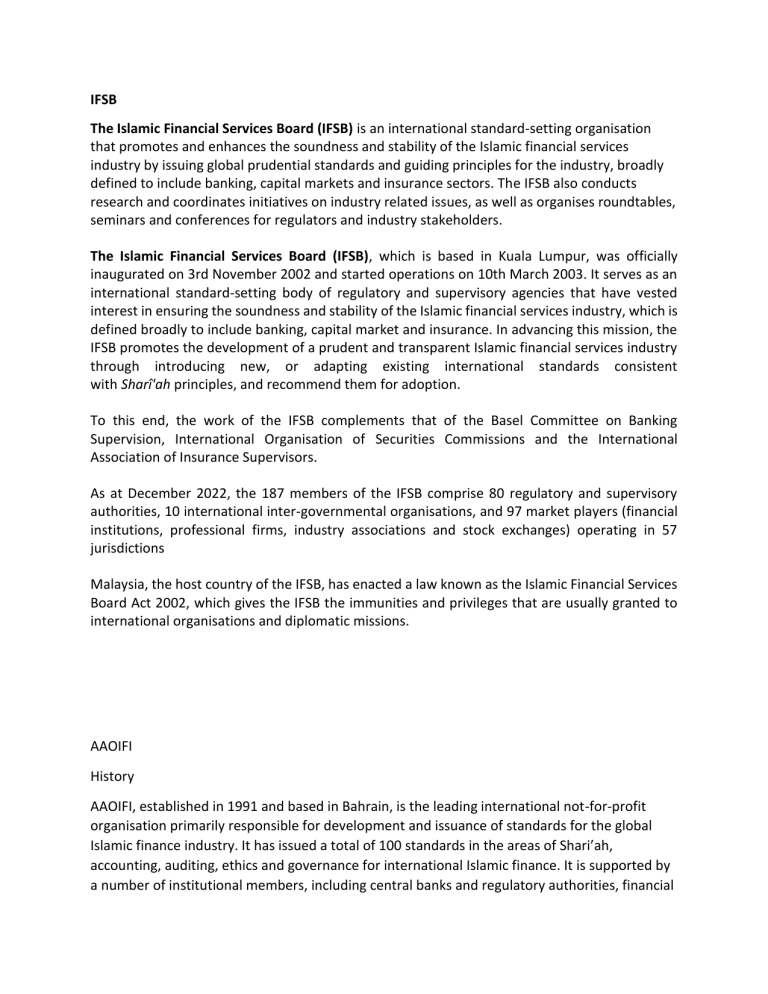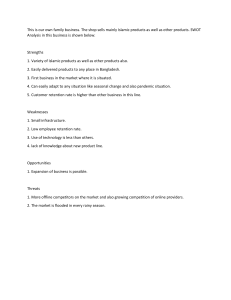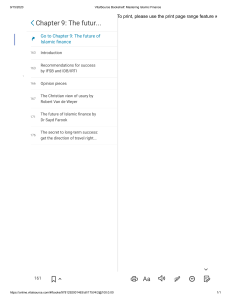
IFSB The Islamic Financial Services Board (IFSB) is an international standard-setting organisation that promotes and enhances the soundness and stability of the Islamic financial services industry by issuing global prudential standards and guiding principles for the industry, broadly defined to include banking, capital markets and insurance sectors. The IFSB also conducts research and coordinates initiatives on industry related issues, as well as organises roundtables, seminars and conferences for regulators and industry stakeholders. The Islamic Financial Services Board (IFSB), which is based in Kuala Lumpur, was officially inaugurated on 3rd November 2002 and started operations on 10th March 2003. It serves as an international standard-setting body of regulatory and supervisory agencies that have vested interest in ensuring the soundness and stability of the Islamic financial services industry, which is defined broadly to include banking, capital market and insurance. In advancing this mission, the IFSB promotes the development of a prudent and transparent Islamic financial services industry through introducing new, or adapting existing international standards consistent with Sharî'ah principles, and recommend them for adoption. To this end, the work of the IFSB complements that of the Basel Committee on Banking Supervision, International Organisation of Securities Commissions and the International Association of Insurance Supervisors. As at December 2022, the 187 members of the IFSB comprise 80 regulatory and supervisory authorities, 10 international inter-governmental organisations, and 97 market players (financial institutions, professional firms, industry associations and stock exchanges) operating in 57 jurisdictions Malaysia, the host country of the IFSB, has enacted a law known as the Islamic Financial Services Board Act 2002, which gives the IFSB the immunities and privileges that are usually granted to international organisations and diplomatic missions. AAOIFI History AAOIFI, established in 1991 and based in Bahrain, is the leading international not-for-profit organisation primarily responsible for development and issuance of standards for the global Islamic finance industry. It has issued a total of 100 standards in the areas of Shari’ah, accounting, auditing, ethics and governance for international Islamic finance. It is supported by a number of institutional members, including central banks and regulatory authorities, financial institutions, accounting and auditing firms, and legal firms, from over 45 countries. Its standards are currently followed by all the leading Islamic financial institutions across the world and have introduced a progressive degree of harmonisation of international Islamic finance practices. Objectives: AAOIFI, within the Islamic Shari’ah rules and principles, has the following objectives: 1. to Develop accounting, auditing, governance and ethical thought relating to the activities of Islamic financial institutions taking into consideration the international standards and practices which comply with Islamic Shari’ah rules; 2. to Disseminate the accounting, auditing, governance and ethical thought relating to the activities of Islamic financial institutions and its application through training seminars, publication of periodical newsletters, preparation of reports, research and through other means; 3. (A) Harmonize the accounting policies and procedures adopted by Islamic financial institutions through the preparation and issuance of accounting standards and the interpretations of the same to the said institutions. (B) Improve the quality and uniformity of auditing and governance practices relating to Islamic financial institutions through the preparation and issuance of auditing and governance standards and the interpretation of the same to the said institutions. (C) Promote good ethical practices relating to Islamic financial institutions through the preparation and issuance of codes of ethics to these institutions. 4. Achieve conformity or similarity -to the extent possible- in concepts and applications among the Shari’ah supervisory boards of Islamic financial institutions to avoid contradiction and inconsistency between the fatwas and the applications by these institutions, with a view to activate the role of the Shari’ah supervisory boards of Islamic financial institutions and central banks through the preparation, issuance and interpretations of Shari’ah standards and Shari’ah rules for investment, financing and insurance. 5. To approach the concerned regulatory bodies, Islamic financial institutions, other financial institutions that offer Islamic financial services, and accounting and auditing firms in order to implement the standards, as well as the statements and guidelines that are published by AAOIFI. 6. To offer educational and training programs, including professional development programs on accounting, auditing, ethics, governance, Shari’ah, and other related areas, so as to promote knowledge on, and to encourage greater professionalism in, Islamic banking and finance. Training, examination and certification shall be carried out by AAOIFI itself and/or in coordination with other institutions. 7. To carry out other activities, including certification of compliance of AAOIFI’s standards, so as to gain wider awareness and acceptance of AAOIFI’s standards on accounting, auditing, ethics, governance, and Shari’ah. AAOIFI carries out these objectives in accordance with the precepts of Islamic Shari’ah which represents a comprehensive system for all aspects of life, in conformity with the environment in which Islamic financial institutions have developed. This activity is intended both to enhance the confidence of users of the financial statements of Islamic financial institutions in the information that is produced about these institutions, and to encourage these users to invest or deposit their funds in Islamic financial institutions and to use their services. Vision: To guide IF’s markets operation and financial reporting on Shari’ah principles and rules. To provide IF markets with standards and guidelines that can support the growth of the industry. Mission Standardization and harmonization of international Islamic finance practices and financial reporting in accordance to Shari’ah. Organizational Structure 1 The General Assembly, the Board of Trustees, the Executive Committee and the General Secretariat. 2 The Technical Boards, namely: the Accounting Board, the Shari’ah Board, and the Governance and Ethics Board. OIC History History The Organisation of Islamic Cooperation (OIC) is the second largest organization after the United Nations with a membership of 57 states spread over four continents. The Organization is the collective voice of the Muslim world. It endeavors to safeguard and protect the interests of the Muslim world in the spirit of promoting international peace and harmony among various people of the world. The Organization was established upon a decision of the historical summit which took place in Rabat, Kingdom of Morocco on 12th Rajab 1389 Hijra (25 September 1969) following the criminal arson of Al-Aqsa Mosque in occupied Jerusalem. In 1970 the first ever meeting of Islamic Conference of Foreign Minister (ICFM) was held in Jeddah which decided to establish a permanent secretariat in Jeddah headed by the organization’s secretary general. Amb. Hissein Brahim Taha is the 12th Secretary General who assumed the office in November 2021. The first OIC Charter was adopted by the 3rd ICFM Session held in 1972. The Charter laid down the objectives and principles of the organization and fundamental purposes to strengthen the solidarity and cooperation among the Member States. Over the last 40 years, the membership has grown from its founding members of 30 to 57 states. The Charter was amended to keep pace with the developments that have unraveled across the world. The present Charter of the OIC was adopted by the Eleventh Islamic Summit held in Dakar on 13-14 March 2008 to become the pillar of the OIC future Islamic action in line with the requirements of the 21st century. The Organization has the singular honor to galvanize the Ummah into a unified body and have actively represented the Muslims by espousing all causes close to the hearts of over 1.5 billion Muslims of the world. The Organization has consultative and cooperative relations with the UN and other inter-governmental organizations to protect the vital interests of the Muslims and to work for the settlement of conflicts and disputes involving Member States. In safeguarding the true values of Islam and the Muslims, the organization has taken various steps to remove misperceptions and has strongly advocated elimination of discrimination against Muslims in all forms and manifestations. The Member States of the OIC face many challenges in the 21st century and to address those challenges, the Third Extraordinary Session of the Islamic Summit held in Makkah in December 2005, laid down the blue print called the Ten-Year Program of Action. It successfully concluded with the close of 2015. A successor programme for the next decade (2016-2025) has since then been adopted. The new programme OIC-2025 is anchored in the provisions of the OIC Charter and focuses on 18 priority areas with 107 goals. The priority areas include issues of Peace and Security, Palestine and Al-Quds, Poverty Alleviation, Counter-terrorism, Investment and Finance, Food Security, Science and Technology, Climate Change and Sustainability, Moderation, Culture and Interfaith Harmony, Empowerment of Women, Joint Islamic Humanitarian Action, Human Rights and Good Governance, among others. Among the OIC’s key bodies: the Islamic Summit, the Council of Foreign Ministers (CFM), the General Secretariat, in addition to the Al-Quds Committee and three permanent committees concerned with science and technology, economy and trade, and information and culture. There are also specialized organs under the banner of the OIC including the Islamic Development Bank and the Islamic Educational, Scientific and Cultural Organization, as well as subsidiary and affiliate organs that play a vital role in boosting cooperation in various fields among the OIC member states. THE GENERAL SECRETARIAT It was established by the First Islamic Conference of Foreign Ministers, held in Jeddah, Kingdom of Saudi Arabia, in Muharram 1390H (February 1970). The General Secretariat comprises a Secretary General who is the Chief Administrative Officer of the Organisation and such staff as the Organisation requires. The Secretary General: The Secretary General is elected by the Council of Foreign Ministers for a period of five years, renewable once only. The Secretary-General is elected from among nationals of the Member States in accordance with the principles of equitable geographical distribution, rotation and equal opportunity for all Member States with due consideration to competence, integrity and experience. The Secretary General assumes the following responsibilities: 1. bring to the attention of the competent organs of the Organisation matters which, in his opinion, may serve or impair the objectives of the Organisation; 2. follow-up the implementation of decisions, resolutions and recommendations of the Islamic Summits, and Councils of Foreign Ministers and other Ministerial meetings; 3. provide the Member States with working papers and memoranda, in implementation of the decisions, resolutions and recommendations of the Islamic Summits and the Councils of Foreign Ministers; 4. coordinate and harmonize, the work of the relevant Organs of the Organisation; 5. prepare the programme and the budget of the General Secretariat; 6. promote communication among Member States and facilitate consultations and exchange of views as well as the dissemination of information that could be of importance to Member States; 7. perform such other functions as are entrusted to him by the Islamic Summit or the Council of Foreign Ministers; 8. submit annual reports to the Council of Foreign Ministers on the work of the Organisation.




